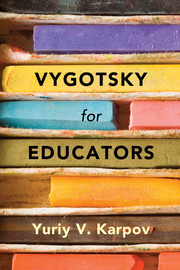Book contents
- Frontmatter
- Dedication
- Contents
- List of Figures
- Acknowledgments
- Introduction
- Part I Mediation from Birth through Adolescence
- 1 The Vygotskian Notion of Mediation as the Major Determinant of Children’s Learning and Development
- 2 First Year of Life
- 3 Second and Third Years
- 4 Three- to Six-Year-Olds
- 5 Mediation of Preschoolers’ Activities to Promote School Readiness
- 6 Learning at School: Children Not Only Learn; They Develop As Well
- 7 Understand Adolescents and Make a Difference!
- Part II School: What to Teach and How to Teach
- Notes
- Index
1 - The Vygotskian Notion of Mediation as the Major Determinant of Children’s Learning and Development
Published online by Cambridge University Press: 05 June 2014
- Frontmatter
- Dedication
- Contents
- List of Figures
- Acknowledgments
- Introduction
- Part I Mediation from Birth through Adolescence
- 1 The Vygotskian Notion of Mediation as the Major Determinant of Children’s Learning and Development
- 2 First Year of Life
- 3 Second and Third Years
- 4 Three- to Six-Year-Olds
- 5 Mediation of Preschoolers’ Activities to Promote School Readiness
- 6 Learning at School: Children Not Only Learn; They Develop As Well
- 7 Understand Adolescents and Make a Difference!
- Part II School: What to Teach and How to Teach
- Notes
- Index
Summary
Everybody would agree that the obvious answer to the question “Why do we need our mental processes?” is as follows: Our mental processes serve our practical activities aimed at our adaptation to the environment. In other words, our thinking, memory, attention, and problem-solving strategies make it possible for us to function efficiently in our environment, to meet challenges and solve problems that we come across in our lives. The same is true for animals: Their mental processes serve their practical activities aimed at their adaptation to the environment. The point is, however, that animal environment and human environment are principally different.
Animals live in a natural environment, which has not changed considerably for thousands of years. In the course of evolution and natural selection, each animal species has developed adaptive mechanisms (instincts) that are genetically transmitted from one generation to the next. Animal offsprings are born with these adaptive mechanisms and they are simply adjusted through individual learning to fit the specific characteristics of the environment in which this animal lives. This means that the developmental path of any animal is genetically predetermined: It will develop into an animal of the given species even if it is separated from all the other animals of this species after birth. A wolf-cub will always develop into a wolf.
- Type
- Chapter
- Information
- Vygotsky for Educators , pp. 15 - 29Publisher: Cambridge University PressPrint publication year: 2014
- 1
- Cited by



